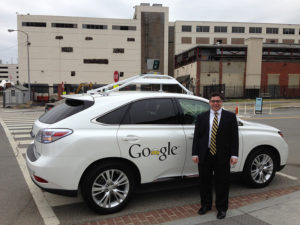
Can Google push its software into automobiles the same way it did smart phones? It turns out, offering free software in exchange for customer data and advertising opportunities is as attractive for automobiles as it is for smart phones. An auto-group including Renault, Nissan and Mitsubishi has decided to add Android to its vehicles. Will the move tie the automakers to Google forever? Reuters reports:
Renault, Nissan and Mitsubishi said on Tuesday their cars will use Google’s Android operating system from 2021. The Franco-Japanese alliance, which sold 10.6 million vehicles last year, currently uses a mish-mash of technology including open-source Linux software. Neither side disclosed the terms of the deal. But the assumption is that the search giant will take a similar approach as it does with smartphones, where it gives away software in return for user data and pre-installing its apps.
The switch should make drivers’ lives easier. Modern cars have “infotainment” systems on a screen below the dashboard to help with navigation, playing music and other jobs. That software – usually powered by BlackBerry-owned QNX, Linux or Microsoft – tends to be clunkier than the interface consumers confront on their handsets.
Crucially, the carmakers’ systems often lack app stores like Google Play. Incorporating Android into cars gives a huge community of developers an added incentive to come up with new applications for, say, finding parking spaces or paying for tickets. Rivals like Peugeot and Toyota may have little choice but to follow suit.
Carmakers lose little in the short term. Google is mostly an advertising business, so should be primarily interested in data that allows it to market products based on users’ location, for example. Auto groups could keep control of information about car performance to offer drivers new services like pre-emptive repairs.
Yet as drivers get used to having access to the search giant’s apps in their cars, it will be harder for manufacturers to go elsewhere. That’s the predicament smartphone makers face now that Android is installed on 88 percent of handsets, using Statista figures. The tech giant could eventually demand that carmakers give it under-the-hood data that would help its self-driving unit Waymo.
Such an extension of Google’s reach would draw the attention of antitrust authorities: its parent company Alphabet was recently fined 4.3 billion euros by the European Commission for abusing its dominance of the smartphone market.
Carmakers will be wary of giving Google more market power. But they may not have much choice.
Read more here.



